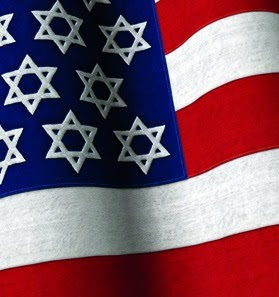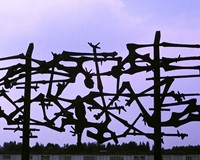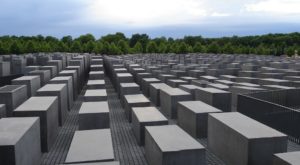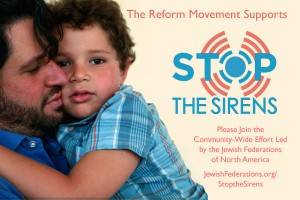 There is much we can learn from the tragedy of Pittsburgh. Important among them is that we have realized our parent ’s dream; we are truly a part of America. This awful incident marks a new understanding of our community’s place within the larger American society. Yes, we have made it here. But what that means is now different.
There is much we can learn from the tragedy of Pittsburgh. Important among them is that we have realized our parent ’s dream; we are truly a part of America. This awful incident marks a new understanding of our community’s place within the larger American society. Yes, we have made it here. But what that means is now different.
I am suggesting a new definition of “making it here” which is not about assimilation but rather acculturation, maintaining a blended Jewish and American identity, an American subgroup securely joining not only in the fight for our American ideals but also in the proximate threat of Anti-Semitism. This ability to fully and unapologetically embrace our dual identities, engage in championing and defending the ideals and values for us and for all, while confident and secure of our rightful place as citizens; this is what it means to “make it in America.”
Many of our forebears were content with the economic opportunity America offered, as well as the refuge from violence and persecution that were part the life of their homelands. They sought survival, not equality, imagining they might assimilate and become Americans. Although great strides were made, lingering fear and insecurity kept the American Jewish voice from being bolder in demanding action to save the Jews of Europe. The “go along to get along” mentality is part of our past. We are secure enough in our place as Americans to fight for ourselves and for others. Yet darkness lingers and Anti-Semitism persists.
We have long embraced the notion that none are free until all are free and we fight on behalf of others yet to enjoy the full blessings of our country. But now, with White Nationalism and Anti-Semitism, on the rise we have a renewed personal stake in the fight. This struggle against hate and violence is harsher and more hardscrabble than our previous contests for justice and equality, such as those against quotas or deed restrictions. The “no coloreds, Jews, or dogs “ signs from what we thought was a vanquished past reappears in our consciousness. The privileged position many thought we enjoyed needs to be reconsidered and recast.
For most of our history, we Jews have taken care of ourselves. Our morning prayer, Eilu D’varim, include the obligations we set out for ourselves as responsible members of the community: visiting the sick, burying the dead, comforting the mourner among them. We have developed our own institutions devoted to assisting in those practices. HIAS, Jewish Hospitals, and Jewish Universities were created to respond to the needs of our people. Our modern Federation, JCC, and JFCS can trace their roots to this historical understanding that we have been segregated from the broader society; that we had to rely on ourselves to provide for us, as the larger society in which we lived would not. From this self-reliance, we have then reached out to assist others.
The understanding of our mission of helping those in need, the social justice mission at the heart of Tikkun Olam and Tzedakah, emanates from the values of compassion and outreach to the unheard and unseen. Because of our history, Jews have been reluctant to accept help from outsiders, even as we support others. We have been quick to join the fight for Civil Rights but slow to bring outsiders into our places of need. Perhaps, due to our history, such help is suspect, perceived in our collective psyche as a sign of weakness or vulnerability. Pittsburgh has changed that.
When we examine our history, we wonder whether our golden age in America was fleeting or is it enduring. I believe it is the latter, but it is none-the-less threatened by malevolent forces. A recent poll[1] indicated that almost 6% of the non-Hispanic American population, or about 11million, subscribes to the views of the Alt-Right. This means two very important things: First, 94% don’t accept these hate-filled views AND second, that a real Anti-Semitic threat exists. Both of these are part of our reality and we must be alert to the implications of both.
The overwhelming nature of the horror perpetrated upon the Jews in Tree of Life Synagogue has knocked us down with a blunt force that was overwhelming. Every resource we have is insufficient to provide a full measure of comfort. We are indeed vulnerable at this moment. And at this moment, something miraculous happened. The community of Pittsburgh rose up and is trying its best to hold us. Pittsburgh’s various communities, Moslem, Christian, and practically everyone else have come to our aid saying to our Jewish community, “you are one of us and we are appalled. An attack on you is an attack on Pittsburgh, and this will not stand.”
We have in our history experienced extraordinary acts of kindness from outsiders, such as the King of Denmark and the Righteous Gentiles of the Holocaust. And here in 2018 America, the Jewish community needed help and the broader community responded. We are not alone, we are America, supporting and now being supported by our brothers and sisters. It is an extraordinary light shining on a very dark experience. Thank you for your love and support. The refugees who are our forebears have seen their dream of America come true. We are inextricably part of the fabric of America, in both its glory and in its struggle. In the names of those Jewish martyrs so tragically lost, let us join with all others of good will continuing the hard and fraught process to realize the aspirations of the American dream.
[1] University of Alabama, George Hawley, published by UVA’s Institute of Family Studies indicates 5.64% of the 198mm non-Hispanic Whites in the United States have beliefs consistent with the Alt-Right’s worldview.




